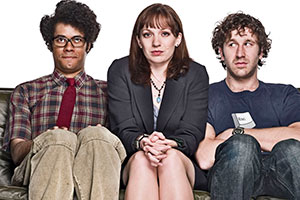Graham Linehan interview
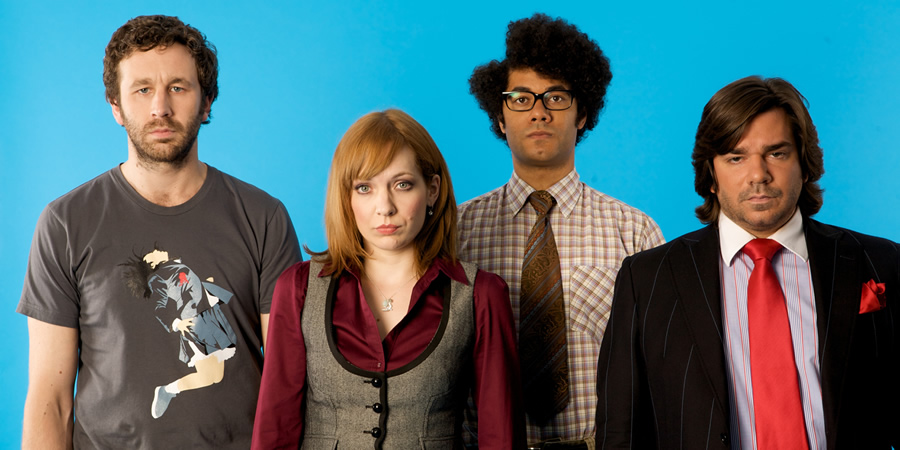
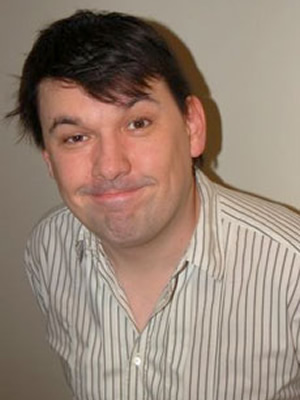
Graham Linehan, the writer and director behind The IT Crowd, tells us more about the new series...
Hi Graham. What do we have to look forward to in the new series?
There'll be no hugging, no learning, no character arcs, and no one gets any wiser: I'm keeping them in a state of nervous stasis I guess. I've tried to continue on the idea that Roy, Moss and Jen are becoming better friends and are enjoying each other's company a bit more.
One thing that is really important for me in this new series was the use of 'nerd' storylines. I used to think that it would make the show too niche - that if I was doing episodes about Dungeons and Dragons maybe only 0.1% of people watching would actually know what that involves. But what I realised is that Jen falls into that 0.1% and I can use her to question the other characters and get more comedy out of the show in return.
What needs explaining in the new series?
Well, Dungeons and Dragons is in there and I can really go for all that nerd stuff now but at the same time mostly its stuff that could happen to anyone. I've always been interested in trying to access the things that Seinfeld was able to access - those little observations about the embarrassments that occur on a daily basis.
Father Ted ran for many series and The IT Crowd is well on its way - do sitcoms improve with age?
No. I think they get worse - they reach a point of perfection and then after that they fall away. Seinfeld around Series 5 was just glorious and then it started getting crazier and sillier until there was a sense that they were sticking anything in that felt crazy. I think it's a good idea to get out before that stage.
If you were to pen an IT Crowd bible for other writers, what would be the rules?
When people come in and they say, 'I've got this storyline when this happens and then this happens and then this happens,' and they've got it all worked out I'm tend not to be very interested. I prefer people coming in and saying, 'I have this mental picture that's very funny and I think it would be funny to get someone in to this situation.' And then let everybody else worry about how to get them in to that situation and how it unfolds from there. Put simply, the idea is not so much to think of stories but think of images, situations and predicaments - worry about the plot later once we've got those funny points.
The way I've always written The IT Crowd is the same way we did Father Ted. You get three big set piece moments with loads of gags leading up to and away from them, and as long as you have those three big moments the rest of the episode is just jokes. The big moments are the ones that people will talk about the next day.
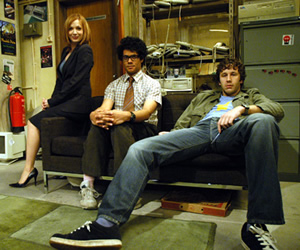
Any chance of a Moss/Jen romance?
Will it did kind of happen at the end of Series 1 and then I just dropped it and hoped that everybody forgot about it. I always thought to myself that what actually happened was that Jen threw up on Moss and that's really why Moss was wearing her dressing gown.
Why has this sitcom worked so well?
I've got a great cast who are capable of hitting all those funny beats and I guess I'm always quite rigorous about scripts. There's an unspoken belief among too many people, including writers, that scripts are just dialogue when actually they are also about what happens visually. For example, the big set piece moments I was talking about? They're usually visual. So I always try and keep the dynamic going of visual joke followed by dialogue passage followed by one-liner, followed by musical joke, and so on, just to keep it interesting and have dynamics.
Where do you get the gags from?
Basically every single thing that strikes me as funny I write it down and try and crowbar it in to the show. There's a kind of magpie stage where I look for incidents and stories - I'm always begging people to tell me funny anecdotes and stuff like that. You can use them if people just tell you them; but you can't ask for them. That's like cheating.
I also get a lot of ideas just surfing online - I saw this hilarious photograph online of a guy in a Starbucks with his laptop open and a gaming rig and he was doing flight simulation with earphones on, pedals at his feet - he'd bought all of this stuff down to Starbucks! It was the funniest thing and I just thought, 'I'll have that'. I used it for Moss except I put him in a park which was even better. If it's something that's just a kind of very normal everyday observation joke then I give it to Jen or Roy.
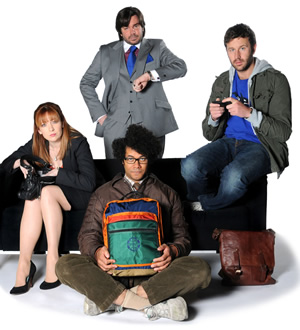
You're a big twitterer. Why not ask on twitter?
I am tempted but there's a delicate balance - I really like the idea of getting the fans involved but it's a weird one - you can't credit everyone; although maybe I could put 'thanks to Twitter' in the end credits?!
Saying that, we have done a few things in this series; for example, in one of the episodes we had to do a massive re-write after we changed the ending and it left me with very little time to really finesse the dialogue - so I asked Twitter. What we were after were euphemisms for arses; and we got some great responses - possibly for me the best one was 'bike rack'.
Does Twitter also help with ideas?
It's been a real help writing this series - not just for company but it takes you down these roads and totally sets off new strands of associations in your head. I found out on Twitter about the guy who went in to the wrong studio on the news and was interviewed - so I gave that to Moss.
How do you use the live studio audience?
If a line doesn't play well then we'll re-do it. We get a lot of pleasure out of surprising the studio audience and we try and make that night a lot of fun for them. They can see all the behind the scenes interaction - things like us having a little discussion, coming up with a new line and it just makes for a more entertaining evening. After all, sitting in a studio audience for three or four hours is really tough but I think people enjoy seeing the process happen in front of their eyes.

